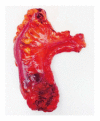Current status of laparoscopy for the treatment of rectal cancer
- PMID: 25386061
- PMCID: PMC4223246
- DOI: 10.3748/wjg.v20.i41.15125
Current status of laparoscopy for the treatment of rectal cancer
Abstract
Surgery for rectal cancer in complex and entails many challenges. While the laparoscopic approach in general and specific to colon cancer has been long proven to have short term benefits and to be oncologically safe, it is still a debatable topic for rectal cancer. The attempt to benefit rectal cancer patients with the known advantages of the laparoscopic approach while not compromising their oncologic outcome has led to the conduction of many studies during the past decade. Herein we describe our technique for laparoscopic proctectomy and assess the current literature dealing with short term outcomes, immediate oncologic measures (such as lymph node yield and specimen quality) and long term oncologic outcomes of laparoscopic rectal cancer surgery. We also briefly evaluate the evolving issues of robotic assisted rectal cancer surgery and the current innovations and trends in the minimally invasive approach to rectal cancer surgery.
Keywords: Laparoscopy; Minimally invasive surgery; Oncological outcomes; Rectal cancer; Short term benefits.
Figures





References
-
- Jacobs M, Verdeja JC, Goldstein HS. Minimally invasive colon resection (laparoscopic colectomy) Surg Laparosc Endosc. 1991;1:144–150. - PubMed
-
- Schlinkert RT. Laparoscopic-assisted right hemicolectomy. Dis Colon Rectum. 1991;34:1030–1031. - PubMed
-
- The Clinical Outcomes of Surgical Therapy Study Group. A comparison of laparoscopically assisted and open colectomy for colon cancer. N Engl J Med. 2004;350:2050–2059. - PubMed
-
- Fleshman J, Sargent DJ, Green E, Anvari M, Stryker SJ, Beart RW, Hellinger M, Flanagan R, Peters W, Nelson H. Laparoscopic colectomy for cancer is not inferior to open surgery based on 5-year data from the COST Study Group trial. Ann Surg. 2007;246:655–662; discussion 662-664. - PubMed
Publication types
MeSH terms
LinkOut - more resources
Full Text Sources
Other Literature Sources
Miscellaneous

